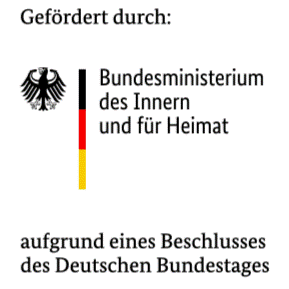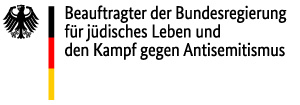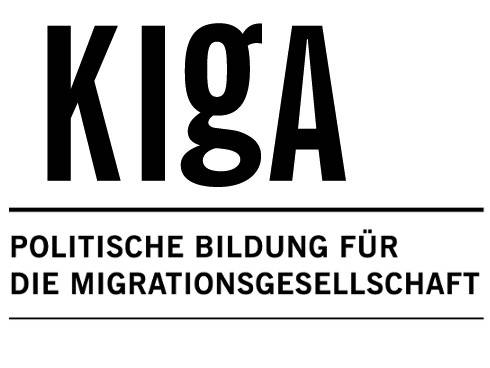First aid
English
Ten tips that will help you, protect you, or bolster you in difficult situations. You’ll also find the „storehouse of knowledge“ here, which explains and classifies terms. Maybe you have a tip you’d like to pass on to others? You can leave it here. Because no one should look the other way when things get dicey!
At a local festival, a right-wing group is becoming aggressive. What can I do?
Tip 1
Contact local officials or inform the police on the telephone number 110. Give your name, the location and describe the situation as calmly as possible.
Tip 2
If you’re not alone or can talk to other people at the festival, you can confront the group together. Often, the perpetrators are known to others. Calmly but firmly make it clear that you won’t tolerate their behaviour. Important: don’t put yourselves in danger.
Tip 3
If possible, document the situation, be sure to write down in detail what you recall. You can give the notes to a victim counselling service or monitoring centre. If there is a Bündnis gegen Rechts („Alliance against the Right“) on the festival ground, then think together about how you want to deal with the situation.
Someone is being attacked on the bus. What can I do?
Tip 1
Direct yourself to the bus driver and ask them to call the police and stop the bus. Alternatively, you can dial 110 directly. Describe the situation and the exact location of the attack as clearly as possible.
You can find a lot more information in English language at the website for VBRG (full English name: Association of Counselling Centres for Victims of Right-Wing, Racist and Anti-Semitic Violence in Germany): https://verband-brg.de/english/
Tip 2
Reach out to fellow travellers and, if possible, stand between the person being attacked and the attackers. Together, you can form a ring around the individual involved. Calmly but firmly ask the perpetrators to leave the victim alone. If possible, document the situation with your smartphone.
Tip 3
Offer your support to the victim: wait with them until the police or emergency services are on the scene and make yourself available as a witness. Ask the person being attacked what they want now, and make sure they aren’t left alone. Inform them about the support provided by victim counselling centres and contact the counselling centre. Don’t forget: write down in detail what you recall of the incident.
Someone in my social circle is becoming radicalised. What can I do?
Tip 1
If someone devalues others as „infidels“ or tries to impose their own religion on others, this can be a sign of religiously motivated radicalisation. It’s important to
clarify calmly whether it’s really about (e.g. Islamist) radicalisation or just devotion to a specific religion. The Bundesarbeitsgemeinschaft religiös begründeter Extremismus (Federal Commitee on Religiously Motivated Extremism) can help you to find support in this matter.
Tip 2
Children want to form their own opinions and be heard. If they identify with right-wing extremist content, it can be very burdensome for parents. It’s important to show interest and seek open dialogue on an equal footing, but also to clarify the limits to intolerant statements.
A child is being ostracised at school. What can I do?
Tip 1
Support the marginalised person: ask them how you can help. Sometimes listening and being there is enough.
Tip 2
Find allies in the group and speak out together against exclusion. Together you’re stronger!
A person with a so-called intellectual disability is being laughed at, bullied or disregarded. What can I do?
Tip 1
If this situation happens to you, try to get help and dare to speak directly to other people who’ve seen the situation to enlist their help.
Tip 2
If you experience the situation in the context of public authorities, at school, when looking for accommodation or at work, you can contact an anti-discrimination
agency or a disability representative. These are available for all federal states in Germany, and additionally at many counselling centres.
Tip 3
If you observe such a situation, talk to the person who has the disability, signal your support. It’s important not to feel alone in such situations. Think together about what needs to be done and who you want to ask for help.
Russian
10 советов, которые помогут вам, защитят или поддержат в сложных ситуациях. Кроме того, здесь вы найдете хранилище знаний, где разъясняются и классифицируются используемые термины. Возможно, у вас также есть совет, которым вы хотели бы поделиться с другими? Тогда вы можете оставить его здесь. Потому что никто не должен оставаться в стороне, когда случается беда!
Женщина стала объектом сексуальных домогательств. Что я могу сделать?
Совет 1
Поговорите с пострадавшей, поддержите ее. В таких ситуациях женщине важно не чувствовать себя одинокой. Вместе подумайте над тем, что нужно сделать и кого бы вы хотели попросить о помощи — например, у стойки бара.
Совет 2
Не предпочли бы вы ответить резкими словами? Но, пока вы размышляете, исчерпана ли ситуация? Важно дать понять, что вы тоже не принимаете такое поведение. Вам не обязательно проявлять особенное остроумие: сексистское поведение тоже неостроумно.
На городском празднике группа правых начинает проявлять агрессию. Что я могу сделать?
Совет 1:
Обратитесь к присутствующим представителям власти или сообщите в полицию по номеру 110. Назовите свое имя и местонахождение и как можно спокойнее опишите ситуацию.
Совет 2:
Если вы не один или можете обратиться к другим присутствующим на празднике людям, вы можете противостоять этой группе вместе. Нередко личность злоумышленников известна. Спокойно, но твердо дайте понять, что вы такого поведения не потерпите. Важно: не подвергайте себя опасности.
Совет 3:
По возможности задокументируйте ситуацию и обязательно составьте по памяти протокол. Записи можно передать в центр консультирования потерпевших либо в центр мониторинга. Если на месте есть представители «Союза против правых», подумайте над тем, каким образом вы хотите уладить ситуацию.
В автобусе на кого-то напали. Что я могу сделать?
Совет 1:
Обратитесь к водителю автобуса и попросите его остановиться и вызвать полицию. Кроме того, вы также можете позвонить 110. Как можно четче опишите ситуацию и укажите точное место нападения.
Более подробно об этом можно узнать из брошюры «Что делать в случае нападения правых»: https://verband-brg.de/vbrg-ratgeber-fuer-betroffene/
Совет 2:
Обратитесь к попутчикам и, по возможности, станьте между жертвой нападения и нападающими. Вместе вы можете образовать круг вокруг пострадавшего. Спокойно, но твердо попросите злоумышленников оставить пострадавшего в покое. По возможности снимите ситуацию с помощью смартфона.
Совет 3:
Предложите жертве нападения свою поддержку: Подождите вместе с этим человеком, пока на место не прибудет полиция либо экстренная служба, и выступите в качестве свидетеля. Спросите у жертвы нападения, чего ей в данный момент хочется, и убедитесь в том, что она не останется наедине. Сообщите ей о возможности получения поддержки в центре консультирования пострадавших и обратитесь в центр консультирования. Не забудьте: составьте по памяти протокол событий.
Человек из моего окружения радикализируется. Что я могу сделать?
Совет 1
Если кто-то пренебрежительно относится к другим как к «неверным» или пытается навязать им собственную религию, это может являться признаком религиозной радикализации. Важно спокойно выяснить, действительно ли речь идет о (например, исламистской) радикализации или просто об обращении в религию.
Поддержку в этом вопросе оказывает Федеральная рабочая группа по вопросам религиозного экстремизма.
Совет 2
Дети хотят иметь собственное мнение и быть услышанными. Если они при этом идентифицируют себя с правоэкстремистским контентом, эта ситуация может вызывать стресс у родителей. Важно искать открытый диалог на равных, демонстрировать заинтересованность, но при этом четко выделять нетолерантные высказывания.
Ребенок подвергается изоляции в школе. Что я могу сделать?
Совет 1:
Поддержите изолируемого. Спросите у него, чем вы можете помочь. Иногда достаточно выслушать и быть рядом.
Совет 2:
Найдите себе союзников в группе и вместе выступайте против изоляции. Вместе вы будете сильнее!
Человека с так называемыми интеллектуальными нарушениями высмеивают, задевают либо оскорбляют. Что я могу сделать?
Совет 1:
Если такая ситуация произошла с вами, попробуйте получить помощь и, набравшись смелости, обратитесь за помощью к другим людям, которые стали очевидцами этой ситуации.
Совет 2:
Если вы столкнулись с такой ситуацией в органах власти, в школе, при поиске жилья или на работе, вы можете обратиться в антидискриминационный центр либо к специалисту по работе с имеющими нарушения людьми. Такие специалисты есть во всех федеральных земель, в том числе во многих консультационных центрах.
Совет 3:
Если вы наблюдаете такую ситуацию, поговорите с имеющим нарушения человеком, выразите ему свою поддержку. В таких ситуациях важно не чувствовать себя одиноким. Сообща подумайте над тем, что нужно сделать и кого бы вы хотели попросить о помощи.
Ukrainian
10 порад, які тобі допоможуть, тебе захистять або підтримають у складних ситуаціях. Крім того, ти знайдеш тут «сховище знань», в якому роз’яснюються та класифікуються відповідні терміни. Можливо, у тебе теж знайдеться порада, якою ти б хотів поділитися з іншими? Тоді ти можеш залишити її тут. Тому що ніхто не має залишатися осторонь, коли трапляється біда!
Жінка зазнає сексуальних домагань. Що я можу зробити?
Порада 1
Заговори з постраждалою та вислови їй підтримку. У таких ситуаціях жінці важливо не почуватися самотньою. Разом подумайте на тим, що потрібно зробити та кого б ви хотіли попросити про допомогу, наприклад, біля стійки бару.
Порада 2
Чи тобі хотілося б краще відповісти крутим слівцем? Та доки ти розмірковуватимеш, може, ситуація вже буде вичерпана? Важливо дати зрозуміти, що ти також такої поведінки не приймаєш. Тобі не потрібно бути особливо дотепною/дотепним, сексистська поведінка також аж ніяк не дотепна.
На міському святі група правих починає виявляти агресію. Що я можу зробити?
Порада 1:
Звернися до присутніх на місці представників влади або повідом поліцію за номером 110. Назви своє ім’я, місце розташування та якомога спокійніше опиши ситуацію.
Порада 2:
Якщо ти не наодинці або можеш звернутися до інших людей, що присутні на святі, ви можете протистояти цій групі разом. Нерідко зловмисники та зловмисниці відомі поліції. Спокійно, але твердо дай зрозуміти, що ти такої поведінки не толеруватимеш. Важливо: Не наражай себе на небезпеку.
Порада 3:
По можливості задокументуй ситуацію та обов’язково склади по пам’яті протокол. Записи ти можеш передати до центру консультування потерпілих або центру моніторингу. Якщо на місці є представники «Союзу проти правих», тоді разом обдумайте, яким чином ви хочете владнати ситуацію.
В автобусі на когось напали. Що я можу зробити?
Порада 1:
Попроси з водія чи водійку автобуса викликати поліцію та зупинитися. Крім того, ти також можеш безпосередньо набрати 110. Якомога чіткіше опиши ситуацію та надай точне місце нападу.
Набагато докладніше про це ти можеш дізнатися з брошури «Що робити після нападу правих»: https://verband-brg.de/vbrg-ratgeber-fuer-betroffene/
Порада 2:
Звернися до попутників та попутниць і, якщо можливо, стань між жертвою нападу та нападниками. Разом ви можете утворити коло навкруги постраждалої особи. Спокійно, але твердо попроси зловмисників/зловмисниць облишити постраждалу особу в спокої. Якщо можливо, задокументуй ситуацію за допомогою свого смартфону.
Порада 3:
Запропонуй жертві нападу свою підтримку: зачекай разом з ним/нею, доки на місце не прибуде поліція або екстрена служба, та виступи як свідок. Запитай в жертви нападу, чого йому/їй наразі бракує та переконайся в тому, щоб він/вона не залишився/залишилася наодинці. Повідом йому/їй про можливість отримання підтримки в центрі консультування постраждалих та звернися до центру консультування. Слід пам’ятати: Склади по пам’яті протокол про подію.
Хтось із мого оточення радикалізується. Що я можу зробити?
Порада 1
Якщо хтось зневажливо ставиться до інших як до «невірних» або намагається нав’язати їм власну релігію, це може бути ознакою релігійної радикалізації. Важливо спокійно з’ясувати, чи справді йдеться про (наприклад, ісламістську) радикалізацію чи просто про навернення до релігії.
Підтримку в цьому питанні надає Федеральна робоча група з питань релігійного екстремізму .
Порада 2
Діти хочуть формувати свої власні судження та бути почутими. Якщо вони себе при цьому ідентифікують із правоекстремістським контентом, ця ситуація може викликати неабиякий стрес у батьків. Важливо шукати відкритого діалогу на рівних, демонструвати зацікавленість, але також і чітко відмежовуватись від нетолерантних висловлювань.
Дитину в школі не приймають до гурту. Що я можу зробити?
Порада 1:
Підтримай дитину, яка зазнає ізоляції. Запитай у неї, чим ти можеш допомогти. Іноді достатньо лише вислухати та бути поруч.
Порада 2:
Знайди в групі союзників та разом виступайте проти ізоляції. Разом ви сильніші!
Людину з так званим розумовим обмеженням висміюють, зачіпають або ображають. Що я можу зробити?
Порада 1:
Якщо така ситуація трапилася з тобою, спробуй отримати допомогу та, набравшись сміливості, звернися безпосередньо до тих людей, які стали очевидцями цієї ситуації.
Порада 2:
Якщо ти зіткнувся з такою ситуацією в органах влади, в школі, під час пошуку житла чи на роботі, ти можш звернутися до антидискримінаційного центру або до спеціаліста чи спеціалістки по роботі з людьми з обмеженнями. Вони присутні в усіх федеральних землях, у тому числі в багатьох консультаційних центрах.
Порада 3:
Якщо ти спостерігаєш таку ситуацію, поговори з особою з обмеженнями та вислови їй свою підтримку. У таких ситуаціях людині важливо не почуватися самотньою. Разом подумайте на тим, що потрібно зробити та кого б ви хотіли попросити про допомогу.
Turkish
Zor durumlarda sana yardımcı olacak, seni koruyacak veya güçlendirecek 10 ipucu. Ayrıca burada, kavramları açıklayan ve sınıflandıran “bilgi belleğini” de bulabilirsin. Senin de başkalarına iletmek istediğin bir ipucun var mı? Buraya bırakabilirsin. Çünkü işler sarpa sardığında kimse sırtını dönmemeli!
Bir kadın cinsel tacize uğruyor. Ne yapabilirim?
İpucu 1
Kadına yaklaşarak konuş, desteğini göster. Böyle durumlarda insanın yalnız olduğunu hissetmemesi önemli. Birlikte ne yapılabileceğinizi ve örneğin barda kimden yardım isteyebileceğinizi düşünün.
İpucu 2
Havalı bir söz ederek mi tepki vermeyi tercih ediyorsun? Ama ne söyleyeceğini düşünürken durum değişiyor mu? Önemli olan senin de bu davranışı reddettiğini göstermek. Komik olmak zorunda değilsin, sonuçta cinsiyetçi davranış da komik değil.
Şehir festivalinde sağcı bir grup saldırganlaşıyor. Ne yapabilirim?
İpucu 1:
Festivaldeki görevlilere başvur veya 110’u arayıp polise haber ver. Adını ve yerini söyle ve durumu mümkün olduğunca sakin bir şekilde anlat.
İpucu 2:
Tek başına değilsen veya festivalde başka kişilerle konuşabiliyorsan grubun karşısına birlikte çıkabilirsiniz. Çoğu zaman faillerin kim oldukları bilinir. Bu davranışı hoş görmediğinizi sakince, ama kararlılıkla gösterin. Önemli: Kendinizi tehlikeye atmayın.
İpucu 3:
Mümkünse durumu belgele, her durumda bir hafıza protokolü yaz. Kayıtları bir mağdur danışma merkezine veya izleme merkezine verebilirsin. Bulunduğun yerde bir „Sağa karşı birlik“ varsa sonradan birlikte bu durumla ilgili olarak ne yapabileceğinizi düşünün.
Otobüste bir kişiye saldırılıyor. Ne yapabilirim?
İpucu 1:
Otobüs şoförüne başvur, polisi aramasını ve durmasını iste. Alternatif olarak sen de 110’u arayabilirsin. Durumu ve saldırının tam yerini mümkün olduğunca açık şekilde anlat.
“Bir sağcı saldırıdan sonra ne yapmalı” broşüründe daha fazla bilgi bulabilirsin: https://verband-brg.de/vbrg-ratgeber-fuer-betroffene/
İpucu 2:
Diğer yolculara seslen ve – mümkünse – saldırılan kişi ile saldırgan arasına gir. Birlikte saldırıya uğrayan kişinin etrafında bir halka oluşturabilirsiniz. Saldırganlara sakin ama kararlılıkla kişiyi rahat bırakmalarını söyle. Mümkünse durumu akıllı telefonunla belgele.
İpucu 3:
Saldırılan kişiye desteğini göster: Onunla polis veya kurtarma hizmetleri gelinceye kadar bekle ve tanık ol. Saldırılan kişiye şimdi ne istediğini sor ve yalnız kalmayacağından emin ol. Mağdur danışmanlık merkezlerinin desteği hakkında bilgi ver ve danışma merkeziyle iletişim kur. Unutma: Olayla ilgili bir hafıza protokolü yaz.
Çevremde biri radikalleşiyor. Ne yapabilirim?
İpucu 1
Birisi başkalarını “kafir” olarak küçümser veya onlara kendi dinini zorla dayatmaya çalışıyorsa bunlar dine dayalı radikalleşmenin işaretleri olabilir. Önemli olan sakin bir şekilde bunun gerçekten de (örneğin İslamcı) bir radikalleşme mi yoksa sadece bir dine yönelme mi olduğunu anlamak.
Federal Din Kaynaklı Aşırılık Çalışma Grubu bu konuda destek bulmaya yardım ediyor.
İpucu 2
Çocuklar kendi fikirlerini geliştirmek ve duyulmak isterler. Bunu yaparken de aşırı sağ içeriklerle özdeşleşirlerse anne baba için bu çok zorlayıcı bir durum olabilir. Önemli olan onlarla göz seviyesinde açık bir iletişim kurmaya çalışmak, onlara ilgi göstermek, ama aynı zamanda hoşgörüsüz ifadelere karşısında sınırları da netleştirmek.
Bir çocuk okulda dışlanıyor. Ne yapabilirim?
İpucu 1:
Dışlanan kişiyi destekle: Nasıl yardım edebileceğini sor. Bazen dinlemek ve yanında olduğunu göstermek bile yeterlidir.
İpucu 2:
Grupta kendine bir müttefik bul ve birlikte dışlamaya karşı çıkın. Birlikten güç doğar!
Zihinsel engelli bir insan alaya, hakarete veya küçümsemeye uğruyor. Ne yapabilirim?
İpucu 1:
Bu durum sizin başınıza geliyorsa yardım almaya çalışın ve durumu gören diğer insanlarla konuşup onlardan yardım isteyin.
İpucu 2:
Durumu resmi daireler, okul, ev arama veya iş sırasında yaşıyorsanız bir ayrımcılıkla mücadele merkezine veya engelliler görevlisine başvurabilirsiniz. Bu görevliler bütün eyaletlerde ve birçok danışma merkezinde bulunur.
İpucu 3:
Böyle bir durumu gözlemliyorsanız engelli kişiyle konuşun ve ona desteğinizi gösterin. Böyle durumlarda insanın yalnız olduğunu hissetmemesi önemli. Birlikte ne yapılabileceğinizi ve kimden yardım isteyeceğinizi düşünün.





